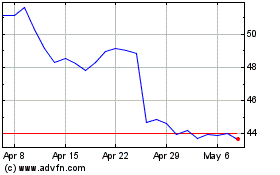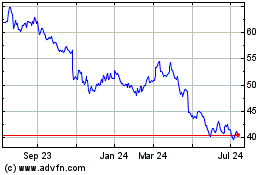Bristol Myers, J&J Arthritis Drugs Cut Covid-19 Deaths in NIH Study
June 02 2022 - 2:24PM
Dow Jones News
By Colin Kellaher
A late-stage study led by the National Institutes of Health to
determine whether drugs used for controlling the immune system
could be used to treat hospitalized Covid-19 patients found that
blockbuster drugs from Bristol Myers Squibb Co. and Johnson &
Johnson helped significantly improve survival rates.
The study found that J&J's Remicade and Bristol's Orencia,
widely used to treat rheumatoid arthritis, didn't significantly
shorten the time to recovery but substantially improved clinical
status and reduced the number of deaths.
According to the NIH, patients receiving each drug showed a
strong but not statistically significant improvement in the primary
endpoint of time to recovery versus placebo, as measured by day of
discharge from hospital.
However, the NIH said patients in the Remicade group had 40.5%
lower adjusted odds of dying and 43.8% better odds of clinical
improvement than those in the placebo group, while those in the
Orencia group had 37.4% lower adjusted odds of dying and 34.2%
better odds of clinical improvement.
Roughly 90% of all study patients also received Gilead Sciences
Inc.'s Covid-19 antiviral drug Veklury.
The study, which originally also included the investigational
drug cenicriviroc from AbbVie Inc., was aimed at evaluating whether
any of the medicines, known as immune modulators, could control an
overreaction of a patient's systemic Covid-19 inflammatory
response, a phenomenon known as a "cytokine storm" for the proteins
that trigger the inflammation.
Cytokine storm can lead to respiratory distress, multiple organ
failure and other severe reactions in hospitalized patients.
The NIH said the study, which enrolled nearly 2,000 patients
from October 2020 through December 2021, showed Remicade and
Orencia could potentially add to the therapeutic options available
for the treatment of hospitalized Covid-19 patients.
Enrollment in a sub-study evaluating the AbbVie drug was stopped
last September after an independent data and safety monitoring
board recommended closing it due to lack of efficacy.
Bristol earlier Thursday said that given the study's findings,
it plans to discuss the data and potential next steps with the U.S.
Food and Drug Administration.
--Thomas M. Burton contributed to this article
Write to Colin Kellaher at colin.kellaher@wsj.com
(END) Dow Jones Newswires
June 02, 2022 14:09 ET (18:09 GMT)
Copyright (c) 2022 Dow Jones & Company, Inc.
Bristol Myers Squibb (NYSE:BMY)
Historical Stock Chart
From Mar 2024 to Apr 2024

Bristol Myers Squibb (NYSE:BMY)
Historical Stock Chart
From Apr 2023 to Apr 2024
